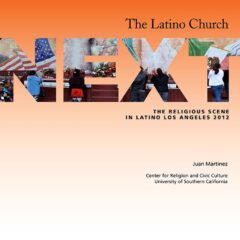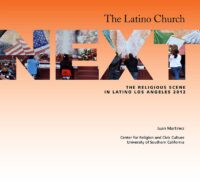After the Southwest was taken over by the United States, the “Mexican” communities of the region felt under siege in many areas, including their religious practices. Maintaining a strong Mexican (often popular) Catholic identity became a way of defending their culture. Roman Catholicism had been the only legally allowed religion before the arrival of the Americans. The American takeover brought religious freedom to the region, though Mexican communities continued to try to enforce the previous understanding of religious practice in the areas where they were the majority. Religious persecution of Latino Protestants within the Latino community was not as pronounced as in Latin America, but it did create long-standing tensions. Latino Protestants found themselves a doubly marginalized community.
Because they were Latinos they were marginalized within U.S. society. But because they were Protestants they were also marginalized in Latino communities. Majority-culture Protestants were not ready to accept them into their churches or communities, even though they were Protestant converts. This situation continued well into the twentieth century both in Los Angeles and elsewhere. Religious persecution of Protestants in Latin America by the Catholic majority defined how Protestants saw themselves and how they perceived Catholicism. Because Catholicism was the official religion of many countries in Latin America throughout most of the 20th century, the relationship between Catholics and Protestants developed very differently in Latin America than in the U.S.
Latino Protestants found themselves between these very different experiences. Most Protestant immigrants assumed that U.S. Catholicism should be understood in the same light as their counterparts in Latin America. U.S. born Latinos varied in their understanding depending on their specific experiences. After Vatican II many Catholics in the U.S. acted as if they were part of one more denomination in this country. The civil rights movement and ecumenical efforts brought Catholics into relationships with mainline Protestants, while the charismatic movement brought a different set of Catholics into contact with Pentecostals and charismatics.
But it was not as easy to adopt to these changes in much of the Latino community. Relationships between Catholic and Protestant Latinos often looked more like the situation in Latin America, where Protestants were still ostracized well into the latter part of the twentieth century. And it continued to look the same when Pentecostals began to grow and increasingly were seen as a threat by the Catholic leadership in Latin America. For example, the official Catholic stance toward Protestants since Vatican II is that they are “separated brethren.” This is the common term used in ecumenical settings. But in Latin America most Pentecostals are seen as a threat to the Catholic Church and are referred to as “sects.” Both John Paul II and Benedict XVI used this term when in Latin America, in reference to Pentecostals and the growing Protestant churches. The relationship between U.S. Latino Protestants and Catholics is complex because it is influenced by the changing relationship between Catholics and Protestants in the United States, but also by the more conflictive history in Latin America.
But the issue also has some unique aspects in the Latino experience. U.S. Latina Catholics are often also in a complex relationship with the Catholic Church. When the United States took over the Southwest and the U.S. Catholic Church took responsibility for the existing Mexican Catholic churches in the Southwest, many of the new religious leaders looked down on popular Mexican Catholic practices and removed many existing Mexican priests. Latinos continue to be underrepresented among priests and bishops.
Many Latina Catholics also feel some of the same “threats” that some Latin American Catholics feel when they see Latinos leaving the Catholic Church and becoming Protestants. Some of the literature on ministry to Latino Catholics warns priests and lay workers to beware of the efforts of some of the Protestants. Nonetheless, things tend to bring Latina Protestantes and Católicos together. On the one hand, the commonality of experience of most Latinos in Los Angeles has meant that both religious groups need to address many of the same issues. But the other reason is often much more personal: during times of celebration or crisis Protestants and Catholics are often part of the same extended family. This means that priests and pastors often find themselves needing to work together when pastoral care is needed.
Yet as Latinos continue to grow in Los Angeles, they will need to find common cause particularly between evangelicals/Pentecostals and Catholics. Immigration reform, the rights of minority peoples, and the place of Latinas in the political and social structures are obvious places where both need to find ways to work together. But these two groups share a common concern about values and ethics and the role of faith both privately and in larger society. Latino leaders, both Catholic and Protestant, also find themselves in the midst of the challenges of globalization, because many have transnational ministries. Their networks of service cross national borders and challenge modern understanding of the nation-state. Latin Americans/Latinos are crossing all types of borders and they are taking their faith with them. The familial and social networks of which they are a part cross the Protestant-Catholic divide.
Latino Christian leaders, both Catholic and Protestant, have to find ways to support them as they walk toward the future. Will relational and missional ecumenism break through the mistrust and historical tensions? Traditionally, Latino Catholic priests and Protestant pastors in Los Angeles have seldom participated in formal ecumenical efforts. Will the official structures encourage, or at least allow, relational ecumenism to develop, or will they continue to insist on trying to limit interaction to the formal types of ecumenism in which Latinos have traditionally not participated?
Juan Martinez is a former fellow with the USC Center for Religion and Civic Culture.


